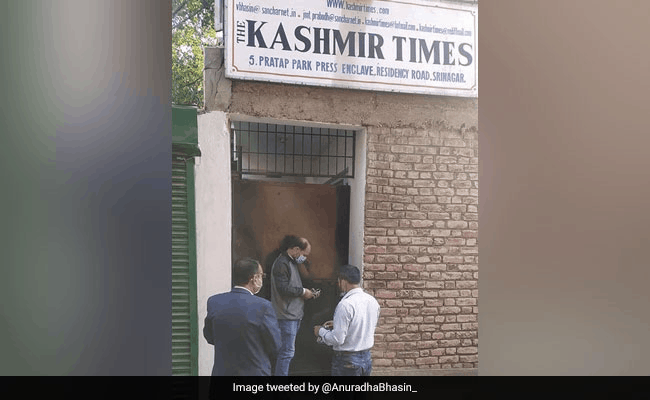Srinagar: Earlier this week on Wednesday (October 28), the National Investigation Agency (NIA) carried out raids at several places in Kashmir, including the office of the newspaper Greater Kashmir and the home of AFP journalist Parvaiz Bukhari.
Besides that, the NIA raided houses of rights activist Khurram Parvez, Parveena Ahanger, Chairperson of the Association of Parents of Disappeared Persons, and the NGO Athrout, among other places. However, these raids have not gone down well within the media fraternity in the Valley, who now view them as part of New Delhi’s attempt to muzzle dissent and crackdown on free speech.
Journalists and other media persons in Kashmir have come out with strong condemnations against the attacks on their colleagues. A day after these raids at least nine associations of journalists in Kashmir have issued a joint condemnation statement describing the raids as “continuous harassment aimed at silencing reporters and curbing the freedom of press.”
“In recent months raids and continued harassment of journalists has become a regular norm and we see it as a broader tactic to intimidate and silence professional journalists, who have been reporting on the region without any prejudice for decades,” mentioned the statement.
London based Kashmiri journalist and novelist Mirza Waheed too issued a statement in solidarity with journalists in Kashmir “who’ve been under assault from an autocratic regime for many years now.”
“In sympathy with the women and men of the press who’ve had to listen to absurd, outlandish definitions of journalism invented by a bureaucratic machine designed to echo diktats from Delhi,” Mirza wrote on his Facebook profile.
This crackdown on press freedom in Kashmir is not new but is only a recent development in the string of continuous events that have unfolded over the past year.
On October 19, the Srinagar office of newspaper Kashmir Times was sealed by the government. Prior to this, its executive editor Anuradha Bhasin had alleged that her government allotted house in Jammu was ransacked by the brother of a former legislator.
For perspective, it is important to underline that Ms. Bhasin had filed a petition in the Supreme Court against the communication blockade imposed by the government of India on August 05, 2019, when the state of Jammu and Kashmir (J&K) lost its special status and was divided into two union territories.
Bhasin believes that she and her newspaper are being targeted because of her petition. She said that it was a result of “vendetta for speaking out.” In a statement, the Editors Guild of India also called the sealing of offices of the newspaper “reprehensible” and termed the action as “vindictive”.
For Kashmir journalists, state oppression is not new
Journalists in the Valley too were irked by the actions of the government and offered solidarities to Ms Bhasin. Apart from the NIA raids on Greater Kashmir, and sealing the offices of Kashmir Times, Kashmir based journalists in general have been facing state repression . They have often found themselves in trouble for simply doing their job.
Getting beaten up while on duty, being charged with anti-terror laws, police summons and being jailed; they have seen it all. In April, photojournalist Masrat Zahra was charged under the stringent UAPA law for sharing her work on social media. A day after, police also booked author and journalist Gowhar Geelani for “glorifying terrorism.”
Around the same time, The Hindu journalist Peerzada Aashiq was also summoned by police for an “inaccurate story.”

